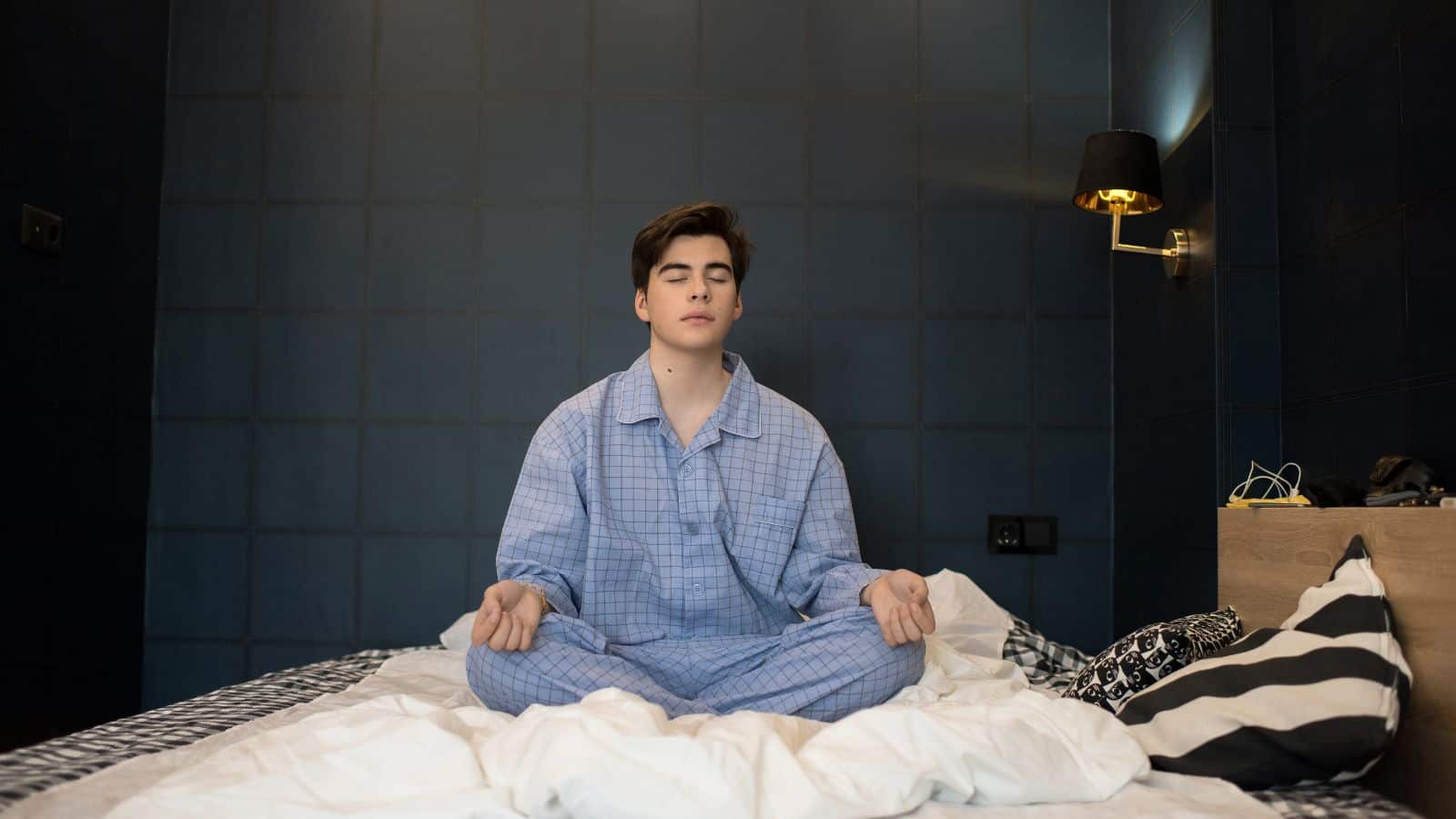It’s frustrating to wake up from a peaceful sleep, unable to nod back off in the middle of the night. Sleep is important to our health, so it’s crucial to develop strategies that help, just like the following 17 methods to get back to sleep when all else fails!
Practice relaxation techniques

Relaxation techniques are a common strategy for getting back to sleep. The idea of counting sheep is a cliche for a reason—it works! Allowing your mind to focus on something other than your thoughts allows you to relax and slowly drift off into dreamland.
Audiobooks

Audiobooks are game-changers when it comes to falling back to sleep, even if you’re an adult! Many are specifically written with a calming storyline and narrated by a soothing voice, tricking your mind into a zen state. As you’re also not using your eyes, these audio bedtime stories allow you to sleep faster.
Magnesium spray

Magnesium has great benefits for our sleep, but with slow absorption rates, tablets will do little to help in the middle of the night. Enter the magnesium spray! The National Library of Medicine has dissected countless studies on this topic, ultimately concluding that transdermal absorption is the most effective method of ingestion.
Avoid stimulants

The worst thing to do when waking up in the middle of the night is to make a cup of coffee. Stimulants have the opposite effect and will keep you awake for longer, so if you feel like a hot drink would help, stick to cocoa.
Meditation

One of the most common reasons we can’t get back to sleep is that we’re lost in our thoughts. Meditation trains you to observe these thoughts and let them go, which will be wonderful for your sleep. Guided meditations also provide a relaxing voice that can help you relax, just like audiobooks!
Aromatherapy oils

Many aromatherapy oils aid sleep; you could put a few drops on your pillow or use them in a scent diffuser, and you may find yourself drifting off once more. Lavender and chamomile are both renowned for their sleep-inducing properties, but you can also try peppermint, bergamot, and sandalwood.
Avoid screen time

We’re on autopilot to pick up our phones when we’re bored, and that includes when we wake up in the middle of the night. However, screen time will not help your predicament; in fact, Harvard Health reminds us that blue light boosts alertness, and too much of it will keep you awake!
Avoid clock watching

Keeping an eye on the time only hinders your efforts to get back to sleep. Clock-watching is one of the biggest disruptors of sleep as it fosters anxiety, particularly if you have to wake up at a specific time. Try not to check the clock and just focus on relaxing.
Use a weighted blanket

Adding a weighted blanket to your sleep routine has major benefits; it promotes calm and helps to reduce stress, relieving symptoms of both anxiety and insomnia. A Swedish study also found that weighted blankets may also have a connection to increased melatonin production, which is necessary for sleep!
Practice gratitude

If you’re struggling to sleep because you’re consumed by negative thoughts, practicing gratitude can really help. Instead of focusing on the bad, diverting your attention to the things you’re grateful for can help these thoughts disappear and help your mind return to a state of calm. It’s worth a try!
White noise

The parenting world is most familiar with the benefits of white noise, but it doesn’t just help babies snooze. White noise masks outside noises that can disrupt sleep and enhance sleep quality, even in adults. According to Healthline, frequent use also helps your brain associate white noise with sleep, making it progressively easier.
Progressive muscle relaxation

While many techniques are mental, progressive muscle relaxation is a physical technique for inducing sleep. Contracting and releasing muscles not only relaxes your body but also distracts your mind; it’s a great technique for relieving tension, stress, and insomnia.
Get up and move

It’s not always helpful to stay in bed, just hoping you drift back off to sleep. Sometimes, getting up and moving about does wonders to induce sleep. It takes your mind off actively trying to force yourself back to sleep, which takes the pressure off.
Sleepy tea

Sometimes, a little tea can help you fall back to sleep, as long as it doesn’t contain caffeine! Many different teas promote sleep; chamomile, lavender, and lemon balm are just a few ingredients often found in sleep-focused herbal tea to help people have a silent night.
Weighted eye mask

When our eyes feel heavy, we know we need sleep, so tricking yourself into this sensation could be smart if you’re suffering from insomnia. A weighted eye mask performs this job by adding heaviness to your eyes, telling your brain it is time to sleep. They also block out almost 100% of light!
Journal

Usually, when we can’t get back to sleep, it’s because we have so much going on in our heads. The concept of journaling is a way of getting those thoughts out of your head and onto paper; it encourages you to relax, relieves stress, and provides you with a one-way ticket to Snoozeville.
Read a book

Finally, if you’re really struggling to get back to sleep, pick up a book! Not only does reading distract you from your thoughts, but the Sleep Foundation also says it induces physical relaxation, releasing muscle tension and slowing the heart rate to help you sleep better. We’re not scientists, but we can certainly confirm that it works!
